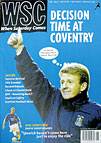 Karl D Pridmore explains how the board at Nottingham Forest tried to change a football club into a public company in 1997
Karl D Pridmore explains how the board at Nottingham Forest tried to change a football club into a public company in 1997
In April the financial future of Nottingham Forest was decided in the High Court, to almost complete indifference in the national press. It’s a complicated tale, but one with important implications for other clubs and, for Forest, a more or less happy ending.
The drive to turn football clubs into potentially prosperous public companies finally caught up with Nottingham Forest in early 1997. The club, until then run on a membership basis, had fallen on hard times after the heights achieved under Brian Clough and had bounced back and forth between the Premiership and First Division. Fuelled by the prospect of a capital injection and under heavy pressure from its bankers, the board of directors, elected from the 200 paid-up members, decided to throw open the doors to a takeover. Enter several consortia promising get-rich-quick schemes to the shareholder/members.
After a protracted bidding process, a consortium gained control which included author Phil Soar (a Spurs fan), former Tottenham chairman Irving Scholar, London businessman Julian Markham and Saracens rugby supremo Nigel Wray. They floated the club on the Alternative Investment Market but the flotation was a complete flop, raising £2 million – about £18 million less than they had predicted.
Division among the board members, poor performances on the pitch and an increasing suspicion that the controlling parties were more interested in personal gain than the welfare of the club all contributed to a groundswell of fan disenchantment. Wray resigned as chairman and brought in local businessman Eric Barnes, who vowed to put “the Nottingham back into Nottingham Forest”. Barnes was elected chairman despite the opposition of Scholar and Markham, who between them owned 25 per cent of the outstanding shares.
Barnes set about fulfilling his pledge to restore the club to the community, bringing in other local businessmen. Lifelong Forest fan Nigel Doughty (defeated in his initial bid to acquire control by the Scholar consortium), agreed to invest up to £12 million in return for a controlling interest in the club and a say in the selection of a new manager. Scholar and Markham resigned from the board.
Now it got nastier. Realising the Scholar-Markham alliance would effectively block his investment in the plc, which required 75 per cent shareholder approval, Doughty was advised that only 51 per cent approval would be required to invest in the football club (the plc’s sole asset). An EGM approved his investment. Scholar and Markham filed suit, claiming the investment was in contravention of company law and prejudicial to them. They demanded that the club be forced to repay the money, which would effectively bankrupt Forest.
During the trial, several startling revelations highlighted just how bitterly divided the board of directors had become. Julian Markham testified that he had secretly bugged board meetings out of fear that other directors were plotting against him. Markham droned on for hours about his intense dislike of Phil Soar. Mr Justice Hart, presiding, considered all of this irrelevant to the issue.
In a remarkable turnaround towards the end of the case, the litigants withdrew their demands for repayment of Doughty’s investment, acknowledging the damage it would do to the club, and instead sought compensation by forcing the individual directors to buy their shares. Their case was dismissed. The judgment in favour of upholding the Doughty investment and dismissing all the litigants’ claims (as well as awarding costs of up to £3 million to the club) was just reward for the fans and shareholders who had long tired of speculative investors reaping personal glory and profit at the expense of the welfare of the club.
There is also a wider issue, namely the wisdom of the public flotation of football clubs. Few have delivered a return on investment for shareholders and apart from the pleasure at “owning a piece of their club” have offered little value to fans. Nottingham Forest is now back in the hands of true fans who have restored the club to the constituency it seeks to serve. But other clubs should take heed.
From WSC 172 June 2001. What was happening this month